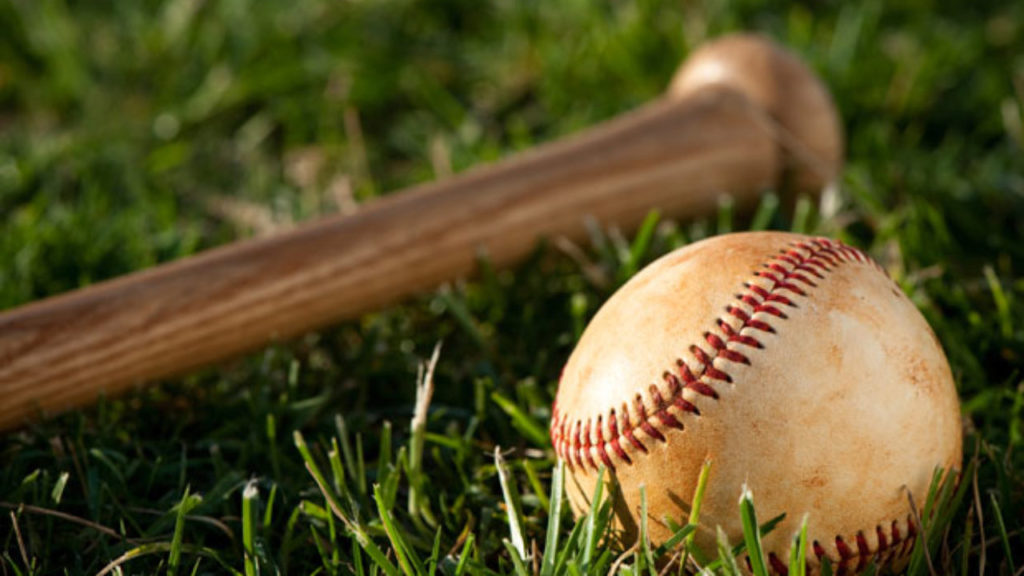Table of Contents
BASEBALL AND MATH
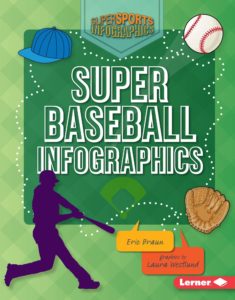 |
By Eric Braun, Super Baseball Infographics (Lerner Classroom, 2015) is a creatively illustrated collection of cool sports facts and figures. For starts, find out what inside a baseball. For ages 8-12. |
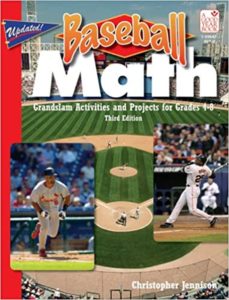
|
Christopher Jennison’s Baseball Math (Good Year Books, 2005) is an arithmetic workbook for grades 4-8 in which all the problems have baseball themes. Topics include basic arithmetical operations, decimals, percents, and ratios, and reading charts and graphs. |
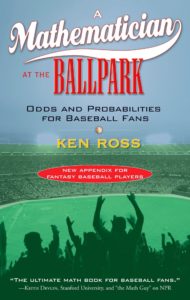
|
Math professor and baseball fan Ken Ross’s A Mathematician at the Ballpark (Plume, 2007) first shows readers how to calculate a batting average (though he prefers the more informative “slugging percentage”), and then spins off into a discussion of the strategy, tactics, and probabilities of the game. (Appendices include both “Binomial Theorem” and “Fantasy Baseball.” Go figure.) For teenagers and adults. |
| From Prongo, Batter’s Up Baseball is a Flash game in which players score hits and runs by solving addition or multiplication problems. (Get a right answer and the crowd cheers.) | |
| From the NCTM, What’s round, hard, and sold for $3 million? is a challenge involving compound interest, based on collector’s baseballs. |
ART, CRAFTS, PUZZLES, AND PROJECTS
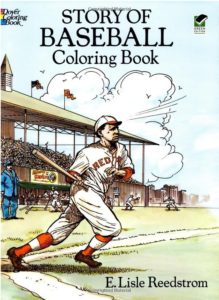 |
E. Lisle Reedstrom’s The Story of Baseball Coloring Book (Dover Publications, 1991) features 45 black-line ready-to-color pictures of famous baseball players, with brief biographies. $3.95. |
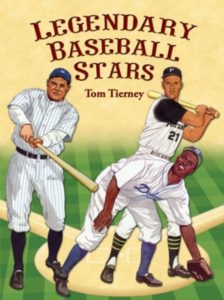 |
Also from Dover, see Tom Tierney’s Legendary Baseball Stars Paper Dolls – a Baseball Hall of Fame dream team, with 16 famous players, each with two uniforms apiece. $9.99. |
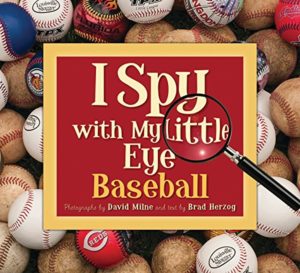
|
Brad Herzog’s I Spy With My Little Eye: Baseball (Sleeping Bear Press, 2011) is visual puzzle book in which readers are challenged to find differences in nearly identical, crammed-full color photographs of balls, bats, mitts, and players. For ages 6-8. |
| From Artists Helping Children, Baseball Crafts for Kids has instructions and patterns for a long and varied list of baseball crafts, among them a pumpkin ballplayer, a moving Rollo-the-Rookie papercraft toy, a baseball piñata, a wearable paper baseball cap, and a baseball bookmark. | |
| From the Kennedy Center, see The Art of Baseball, a multifaceted hands-on lesson in which kids build a model baseball diamond using tiles or pattern blocks, then explore the game of baseball through art, movement, and sound, creating skits, dances, audiotapes, and collages. For ages 5-10. | |
| Make your own personal baseball cards! For instructions, see Teacher Vision’s Student Baseball Cards. | |
| Decorate your own baseball cap! Inexpensive plain white ready-to-decorate caps are available from the Oriental Trading Company or from Discount School Supply. |
BASEBALL IN THE MOVIES
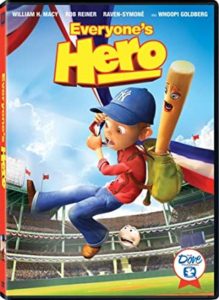
|
Among the recommendations for kids is Everyone’s Hero (2006), the first computer-animated movie devoted to baseball. Young Yankee Irving’s father, a janitor at Yankee Stadium, has been accused of stealing Babe Ruth’s bat, so Yankee, after retrieving the bat from the real thief, sets off on a cross-country trek to return it to Babe Ruth at the World Series and redeem his father’s reputation. He’s accompanied by a talking baseball who bickers continually with the (also talking) Babe Ruth bat. |
| The 25 Best Baseball Movies. At least in one person’s opinion. |
BASEBALL AND PHILOSOPHY
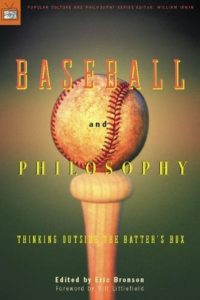
|
In the Popular Culture and Philosophy series – which also features such volumes as Harry Potter and Philosophy, The Lord of the Rings and Philosophy, and Buffy the Vampire Slayer and Philosophy – see Baseball and Philosophy, edited by Erin Bronson (Open Court, 2004) includes essays on a wide range of topics by 18 different philosophers. Sample titles include “Socrates at the Ballpark,” “Democracy and Dissent: Why America Needs Reggie Jackson,” “Baseball, Cheating, and Tradition: Would Kant Cork His Bat?,” “The Zen of Hitting,” and “Should Cubs Fans Be Committed? What Bleacher Bums Have to Teach Us About the Nature of Faith.” For teenagers and adults. |
| In the same series, see The Red Sox and Philosophy (Open Court, 2010), edited by Michael Macomber. Thirty different philosophers discuss the Red Sox as they relate to everything from Aristotle to Sartre. |
